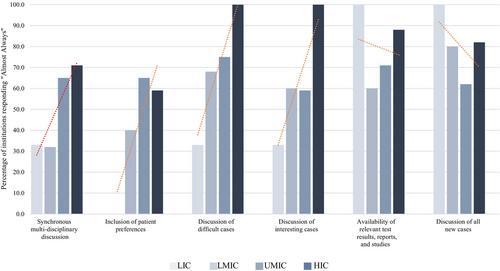Multidisciplinary care meeting practices across diverse international settings
Abstract
Purpose
Multidisciplinary care (MDC) meetings improve the quality of cancer care by providing a space for interdisciplinary communication. The Pediatric Oncology Facility Integrated Local Evaluation (PrOFILE) tool assesses MDC meetings as part of the Service Integration module. We aimed to evaluate the characteristics of MDC meetings at institutions that completed PrOFILE.
Methods
From 2019 to 2021, 112 institutions from 23 countries collected data by utilizing the abbreviated version of PrOFILE. Within a secondary data analysis, we descriptively analyzed the characteristics of MDC meetings stratified by income level.
Results
Participating institutions were located in low-income countries (LICs) (n = 6), lower-middle-income countries (LMICs) (n = 34), upper-middle-income countries (UMICs) (n = 55), and high-income countries (HICs) (n = 17). Of the 112 participating facilities, 79% reported having MDC meetings. The existence of an MDC varied with income, with 50% of LICs and 100% of HICs hosting MDCs. The frequency of MDC meetings also differed, with 100% of MDCs in LICs occurring weekly, while 53% of MDCs in HICs occurred monthly. Specialties regularly represented at MDC meetings across all participating institutions were hematology/oncology (93%), pathology (52%), radiology (60%), general surgery (57%), and radiation oncology (51%). All MDC meetings in LICs reported representation from these specialties. Availability of test results and discussion of new cases did not vary with income. Residual disparities were identified for the following characteristics: discussion of new and interesting cases, inclusion of patient preferences, and ability to meet urgently.
Conclusions
The existence and components of a functional MDC meeting may vary between countries' income levels. Variation in certain components, such as access to tests, may be due to differences in resource distribution, but other factors such as inclusion of patient preferences and ability to meet urgently can be optimized in all settings to foster high-quality teamwork and communication.


 求助内容:
求助内容: 应助结果提醒方式:
应助结果提醒方式:


